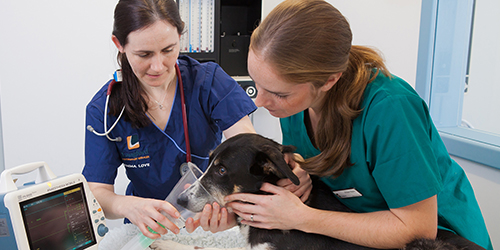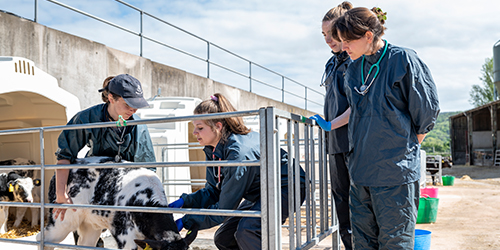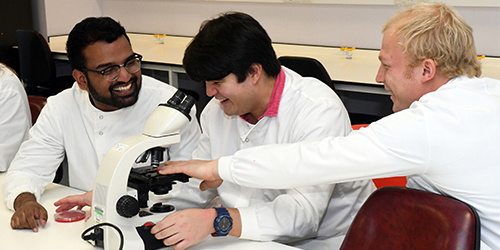Veterinary Science
Our veterinary science degrees are widely accredited and offer access to extensive onsite facilities with teaching informed by cutting-edge research.
World-leading
Bristol is ranked in the world’s top 20 universities for veterinary science (QS World University Rankings by Subject 2024).
Outstanding clinical experience
The campus is home to our small animal referral hospital, modern dairy farm, wet labs and award-winning, internationally-recognised clinical skills laboratory.
Cutting edge research
We are the only Veterinary School in the UK to receive a 100% 4* rating for research impact case studies (REF 2021).
Veterinary Science courses for 2025
Single Honours
Veterinary Science at Bristol
When you study veterinary science at Bristol you become part of a supportive and welcoming community. Experience both our rural Vet School campus and city life and enjoy extensive onsite facilities that allow you to become immersed in animal science and welfare.
We are proud to say that Bristol Veterinary School has been training veterinary professionals for 75 years. You will receive a strong scientific education alongside exceptional professional skills training. Bristol's training strengths include farm animal science, animal welfare and veterinary public health, reflecting the importance of vets to the Global and One Health agendas.
You will be introduced to the integrated structure and function of healthy animals, followed by the mechanisms of disease and their clinical management.
Students have the opportunity to intercalate into another science course between years three and four.
The teaching staff are exceptionally skilled and passionate about what they do, which is very inspiring. Everyone is very friendly, accessible and welcoming. Bristol has provided me with many opportunities to explore my interests.
Career prospects

93% of our veterinary science students are in work or further study within 15 months of graduation (DiscoverUni).
Veterinary science graduates are well prepared for a variety of careers in the veterinary field worldwide. Study is robustly underpinned by science and our graduates are adept problem solvers, innovators and entrepreneurs.
Most of our graduates are employed in general practice but many undergo further specialist veterinary training, have careers in academia or work overseas. Veterinary scientists are also employed in the biomedical research industry and there are job opportunities in government agencies, the Royal Army Veterinary Corps and animal charities.
Course structure

There are three routes to getting a Veterinary Science degree at Bristol.
The five-year BVSc Veterinary Science degree is aimed at school leavers and benefits from a refreshed curriculum informed by the latest educational research. The new curriculum has expanded the role of case-based learning and students will work collaboratively in groups to develop their knowledge and skills in addition to completing practical classes, signposting lectures and coursework.
Our BVSc Gateway to Veterinary Science course is a widening participation initiative, for UK students who have the potential to become vets but do not meet the academic entry criteria to apply directly to the five-year BVSc Veterinary Science course. Successful completion of the one-year Gateway programme allows students to progress onto the five-year BVSc Veterinary Science degree.
Alternatively, the Accelerated Graduate Entry degree is a fast-track programme for science graduates, which enables completion of BVSc Veterinary Science in four years instead of five. This has a distinctive, student-led approach that sets the course apart from other graduate entry programmes in the UK. Teaching methods are tailored to the four and five-year programmes, while the subject areas covered are the same. This course integrates with the final two years of our five-year BVSc Veterinary Science degree towards the end of the second year.
Full details of the course structure and entry requirements for each course can be found on the individual course pages.
Accreditation

Our international accreditations will equip you for a range of diverse veterinary careers all over the world. We are one of only a few veterinary schools in the UK to be accredited by all three of the following professional bodies:
- The American Veterinary Medical Association (AVMA)
- The Royal College of Veterinary Surgeons (RCVS)
- The European Association of Establishments for Veterinary Education (EAEVE)
Our American Veterinary Medical Association (AVMA) accreditation reinforces our position as a world leader in teaching and student experience.
The RCVS have a mutual agreement with the Australasian Veterinary Boards Council (AVBC), the Veterinary Council of Ireland (VCI) and the South African Veterinary Council (SAVC), which means graduates of Bristol Veterinary School's veterinary science programmes are also able to practise in Australia, New Zealand, Ireland and South Africa.
